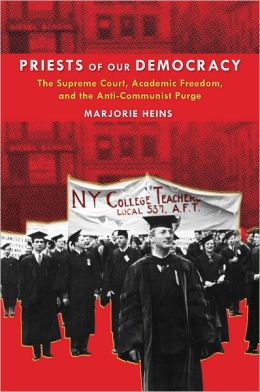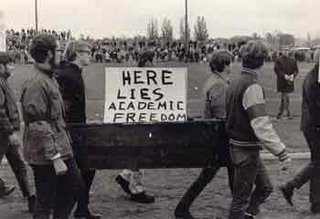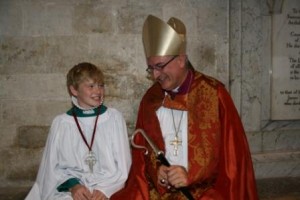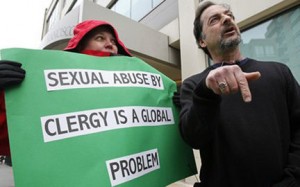Podcast: Play in new window | Download
Updates:
Private Prison Corporation To Have Its Name on Florida Atlantic Football Stadium
—
Priests of Our Democracy, The Supreme Court, Academic Freedom, and the Anti-Communist Purge
Priests of Our Democracy, The Supreme Court, Academic Freedom, and the Anti-Communist Purge is the title of the recently published book by attorney Marjorie Heins. The book examines a very dark period in academic freedom within New York City’s municipal colleges. In the early 1940s, faculty, students and staff were the target of massive investigations into their political beliefs and associations. They hauled before tribunals of the New York State legislature, dozens were stripped of their careers.
Author Marjorie Heinz shows historically, that academic freedom is nothing to take for granted and is always on shaky ground despite being protected by the First Amendment. The backlash of controversy against Students for Justice in Palestine sponsoring a Boycott Divest Sanction event at Brooklyn College is recent example. This is a book for anyone working in education to understand the court battles that tried to preserve a right protected by the Constitution.
- Boards of Trustees which are dominated by corporate executives don’t like these new scholars in the field of social science who are also activists.
- It’s really an attempt of political purge of this national figure.
- The burgeoning forces of academic freedom rally round him, they see the danger.
- In those early days the main attacks on the activist professors really were on activities outside the classroom in support of labor organizing.
- A bunch of professors get together from around the country and form the AAUP, American Association of University Professors. They for the first time issue a declaration of principles on academic freedom.
- The first is freedom in the classroom. The second is freedom is your research and scholarship to pursue learning where it may lead, which means overturning conventional wisdom.
- The third is what they call extramural speech, outside the walls. That was the main target of repression in that period.
- We have to get all these leftists out of the school system because they’re going to indoctrinate the tender minds of our youth with Marxist ideas.
- Harry Keyishian starts the book, he’s one of the wonderful characters I discovered as I was working on it. The Keyishian v. Board of Regents case, 1967 Supreme Court case is famous among First Amendment lawyers because it reversed prior not so good decisions, strikes down the so called Feinberg law which had been passed in 1949 and upheld by the Supreme Court.
- Feinberg law creates a very sweeping program of loyalty investigations for teachers in the public schools.
- 1952 is the height of the witch-hunt at Queens College in New York City when the Senate Internal Security Sub-committee comes to town.
- The Senate Internal Security Sub-committee starts summoning teachers at city colleges.
- “Would you tell Pablo Picasso that he wasn’t qualified to teach art?”
- It’s obscene to see college administrators running around scared like keystone cops he said.
- Some of these investigations were very broad. What books they read, what magazines they subscribed to, did you have Paul Robeson records in your home?
- It’s not until the Keyishian case in 1967 that the Supreme Court says this whole system of loyalty investigations violates the First Amendment and the due process provisions of the Constitution.
- Marjorie Heins Book Events:
- Revolution Books March 5 is sponsored by the New York Civil Liberties Union – 7PM
- Harvard Bookstore, Cambridge, MA, Friday March 15, 3 pm.
- Talking Leaves Bookstore, Buffalo, NY, Sat. March 23, 5 pm.
- Politics & Prose Bookstore, Washington, DC, Sat. June 15, 1 pm.
- Revolution Books March 5 is sponsored by the New York Civil Liberties Union – 7PM
Guest – Marjorie Heins, a civil liberties lawyer, writer, and teacher, and the founding director of the Free Expression Policy Project. Her previous book, Not in Front of the Children, won the American Library Association’s 2002 Eli Oboler Award for best published work in the field of intellectual freedom. Other books include Sex, Sin, and Blasphemy: A Guide to America’s Censorship Wars; Cutting the Mustard: Affirmative Action and the Nature of Excellence; and Strictly Ghetto Property: The Story of Los Siete de la Raza. She is a graduate of Harvard Law School.
———
Encore Interview: New Vatican Rules On Handling Priest Sexual Abuse Cases
Earlier this year, the Vatican had revised its laws making it easier to discipline sex abuser priests. The new internal of the Vatican will use faster judicial procedures instead of full ecclesiastical trials. Critics of the revisions, say the Vatican merely tweaked the process and the new rules don’t hold bishops accountable for abuse by priests on their watch or require that they report the sexual abuse to the authorities. In the same report was the inclusion that attempting to ordain women as priests was comparable to heresy, apostasy and pedophilia. To many it was a comparison meant to resist any suggestion that pedophilia can be addressed by ending the requirement of celibacy.
- SNAP is now a worldwide movement of survivors. We invite supporters join us, we have approximately 10 thousand survivors. Some are spouses and family members but most are survivors; survivors of sexual abuse by priests or other clergy members. Sometimes by religious brothers, by nuns, deacons even bishops.
- We grew in 2002 and 2003 as the headlines were exploding of abuse by priests.
- We have support group meetings in the United States in about 65 different cities. We were extremely naive, not to mention wounded trying to figure out how to make it from day to day. Its empowering for us if we can protect someone who is 12 or 13 from being abused.
- Some documents was released in 2009 in Ireland. Those were the result of government investigations into the allegations of priests and other religious figures sexually abusing children. Victims across Europe, in Germany and Belgium, Austria, Netherlands, England began speaking out and reporting their abuse. In Ireland at the end of 2009, four bishops were resigning their positions.
- From our perspective, what comes out of the Vatican is a lot of lofty words and empty promises. If you look for concrete action, you’ll see very little if any. We as victims are devout Catholics and its really incredible for us to comprehend that someone in the position of authority in the church would not want us to be protected.
- It was heartbreaking and devastating to learn the policy of the church officials is to protect the predators and their assets and their reputations, not the children.
- They’re accountable to no one and its okay for them to continue and commit these crimes.
- The vast majority of victims still do not report. More than 5 thousand priests have been identified are sexual offenders who have abused children between 1950 and 2008.
- 5 percent of priests abusing children. When someone rapes a child they get fired, in the church they get promoted. SNAPnetwork.org / bishopaccountability.org
- We joined a conversation with SNAP looking for ways to insure accountability for what’s going on.
- Is there a legal framework that gets at the widespread nature of this. There’s one book out that discusses the 2000 year old paper trail of sexual abuse in the church.
- You’ll hear things like a cardinal or a pope attempt to make an apology. They’re sorry for what happened to these folks. It didn’t just happen.
- It shows the lack of attention and lack of awareness of the gravity of what’s going on and a prioritization of the church protecting itself and its power, rather than insuring the protection of the kids in the church and others who are vulnerable to abuse by priests.
- It also looks like an attempt to decentralize the responsibility. There are key legal experts who have discussed this as crimes against humanity.
- These are acts that are committed as a widespread or systematic assault or attack on the civilian population.
- When you’re talking about the massive sustained harm that is being caused here and the lack of awareness and acknowledgment. . it’s really astonishing.
- The International Criminal Court is a possible venue that has jurisdiction on crimes against humanity.
- The Church can’t be trusted to police itself.
Guest – Pam Spees, senior staff attorney in the international human rights program at the Center for Constitutional Rights. She has a background in international criminal and human rights law with a gender focus, as well as criminal trial practice
Guest – Barbara Blaine, founder of SNAP, Survivors Network of those Abused by Priests, the nation’s oldest and largest self-help organization for victims of clergy sexual abuse.
————————————————————



